Reflective Essay: Experiences in End-of-Life Care and Nursing Practice
VerifiedAdded on 2023/03/30
|6
|1192
|238
Journal and Reflective Writing
AI Summary
This reflective journal entry details a student's experience caring for a 65-year-old patient with terminal cancer in an aged care setting. The student recounts witnessing the patient's physical and emotional challenges, the deterioration of his condition, and ultimately, his death. The reflection explores the emotional impact of the experience, including feelings of burden, professional challenges, and the difficulty in dealing with the patient's death. The student evaluates the positive aspects of their care, such as maintaining the patient's dignity through communication and empathy, while also acknowledging negative experiences, like struggling to cope with the patient's death. The analysis highlights the importance of communication skills, bereavement support, and the need for nurses to develop resilience in dealing with death and dying. The student concludes with a commitment to learning strategies for overcoming emotional challenges and becoming a better support for bereaved families.
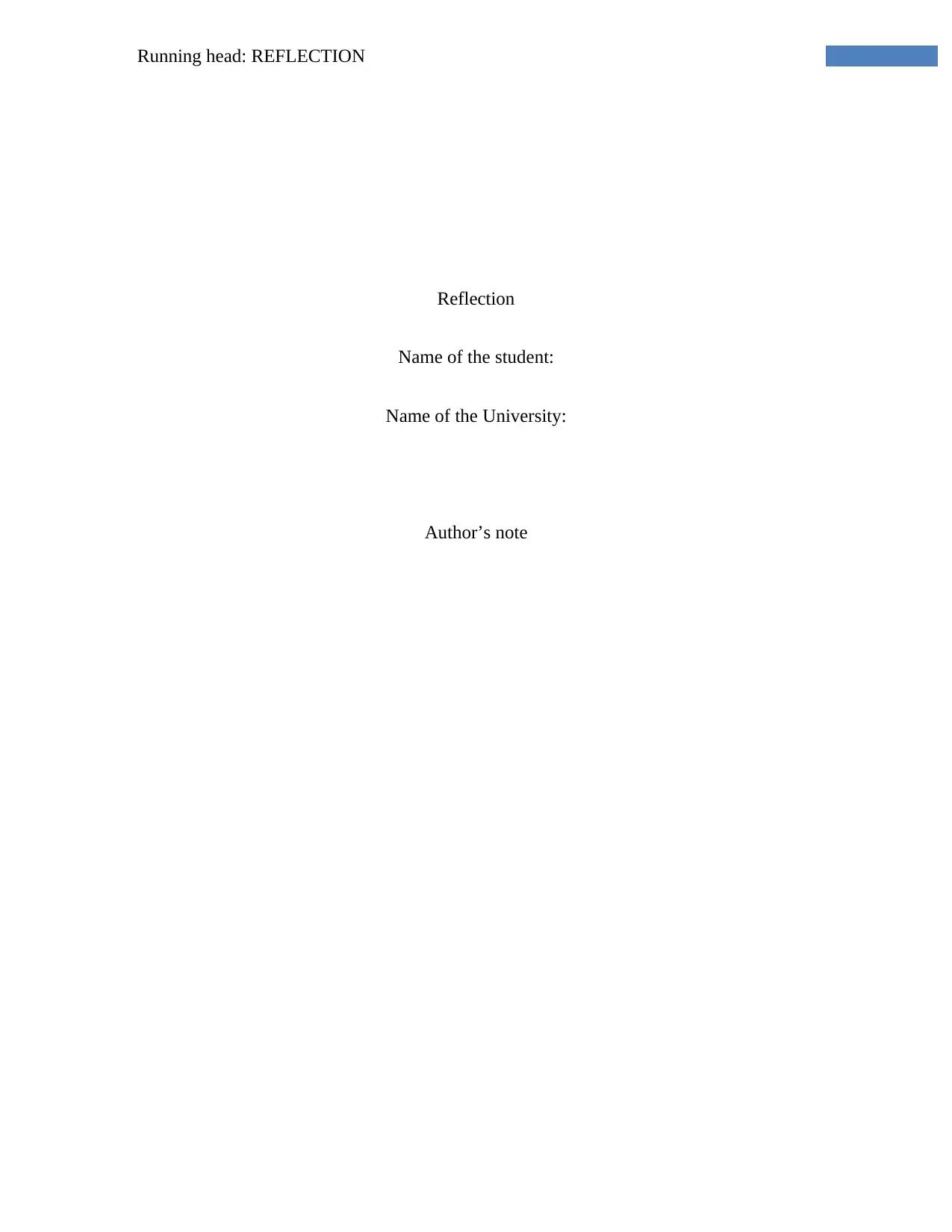
Running head: REFLECTION
Reflection
Name of the student:
Name of the University:
Author’s note
Reflection
Name of the student:
Name of the University:
Author’s note
Paraphrase This Document
Need a fresh take? Get an instant paraphrase of this document with our AI Paraphraser
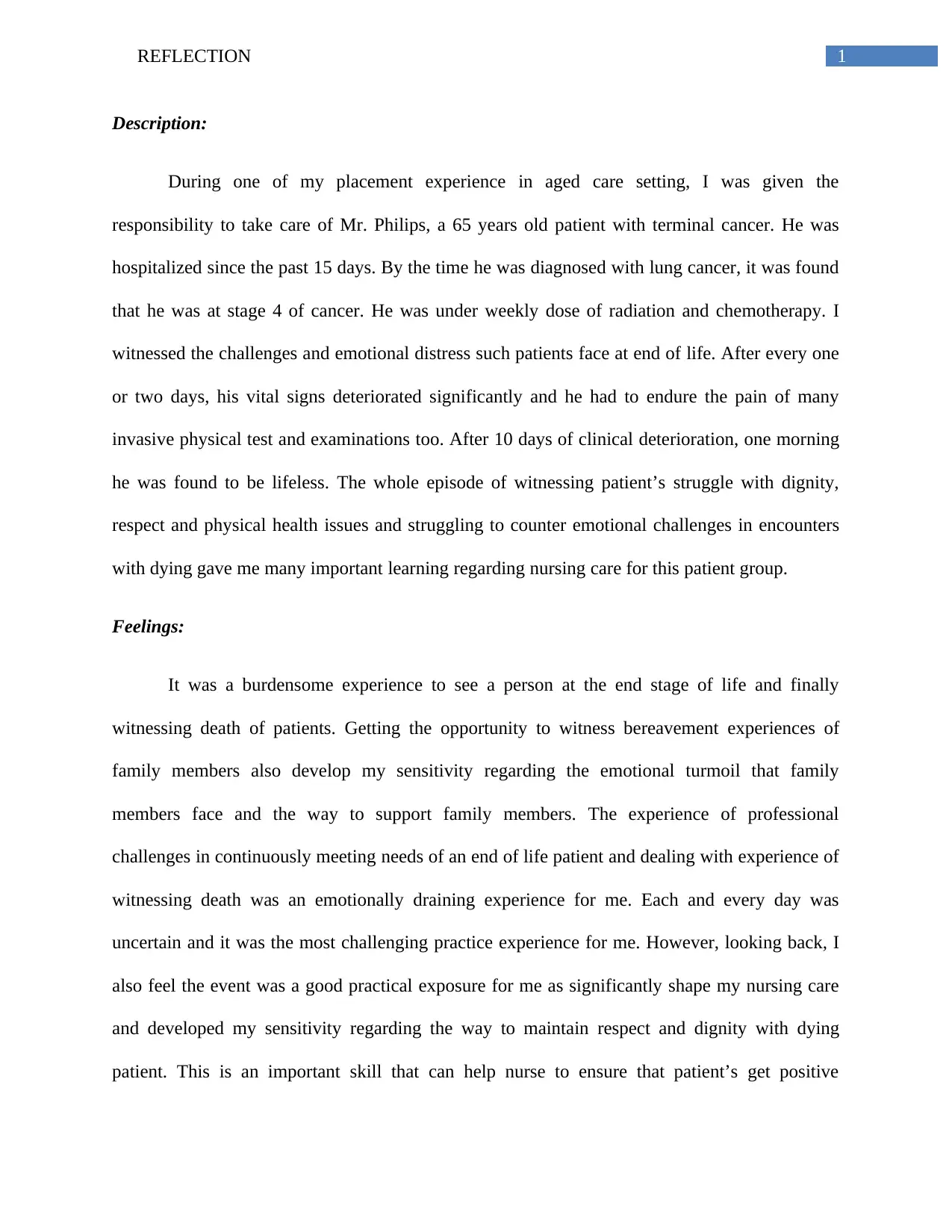
1REFLECTION
Description:
During one of my placement experience in aged care setting, I was given the
responsibility to take care of Mr. Philips, a 65 years old patient with terminal cancer. He was
hospitalized since the past 15 days. By the time he was diagnosed with lung cancer, it was found
that he was at stage 4 of cancer. He was under weekly dose of radiation and chemotherapy. I
witnessed the challenges and emotional distress such patients face at end of life. After every one
or two days, his vital signs deteriorated significantly and he had to endure the pain of many
invasive physical test and examinations too. After 10 days of clinical deterioration, one morning
he was found to be lifeless. The whole episode of witnessing patient’s struggle with dignity,
respect and physical health issues and struggling to counter emotional challenges in encounters
with dying gave me many important learning regarding nursing care for this patient group.
Feelings:
It was a burdensome experience to see a person at the end stage of life and finally
witnessing death of patients. Getting the opportunity to witness bereavement experiences of
family members also develop my sensitivity regarding the emotional turmoil that family
members face and the way to support family members. The experience of professional
challenges in continuously meeting needs of an end of life patient and dealing with experience of
witnessing death was an emotionally draining experience for me. Each and every day was
uncertain and it was the most challenging practice experience for me. However, looking back, I
also feel the event was a good practical exposure for me as significantly shape my nursing care
and developed my sensitivity regarding the way to maintain respect and dignity with dying
patient. This is an important skill that can help nurse to ensure that patient’s get positive
Description:
During one of my placement experience in aged care setting, I was given the
responsibility to take care of Mr. Philips, a 65 years old patient with terminal cancer. He was
hospitalized since the past 15 days. By the time he was diagnosed with lung cancer, it was found
that he was at stage 4 of cancer. He was under weekly dose of radiation and chemotherapy. I
witnessed the challenges and emotional distress such patients face at end of life. After every one
or two days, his vital signs deteriorated significantly and he had to endure the pain of many
invasive physical test and examinations too. After 10 days of clinical deterioration, one morning
he was found to be lifeless. The whole episode of witnessing patient’s struggle with dignity,
respect and physical health issues and struggling to counter emotional challenges in encounters
with dying gave me many important learning regarding nursing care for this patient group.
Feelings:
It was a burdensome experience to see a person at the end stage of life and finally
witnessing death of patients. Getting the opportunity to witness bereavement experiences of
family members also develop my sensitivity regarding the emotional turmoil that family
members face and the way to support family members. The experience of professional
challenges in continuously meeting needs of an end of life patient and dealing with experience of
witnessing death was an emotionally draining experience for me. Each and every day was
uncertain and it was the most challenging practice experience for me. However, looking back, I
also feel the event was a good practical exposure for me as significantly shape my nursing care
and developed my sensitivity regarding the way to maintain respect and dignity with dying
patient. This is an important skill that can help nurse to ensure that patient’s get positive
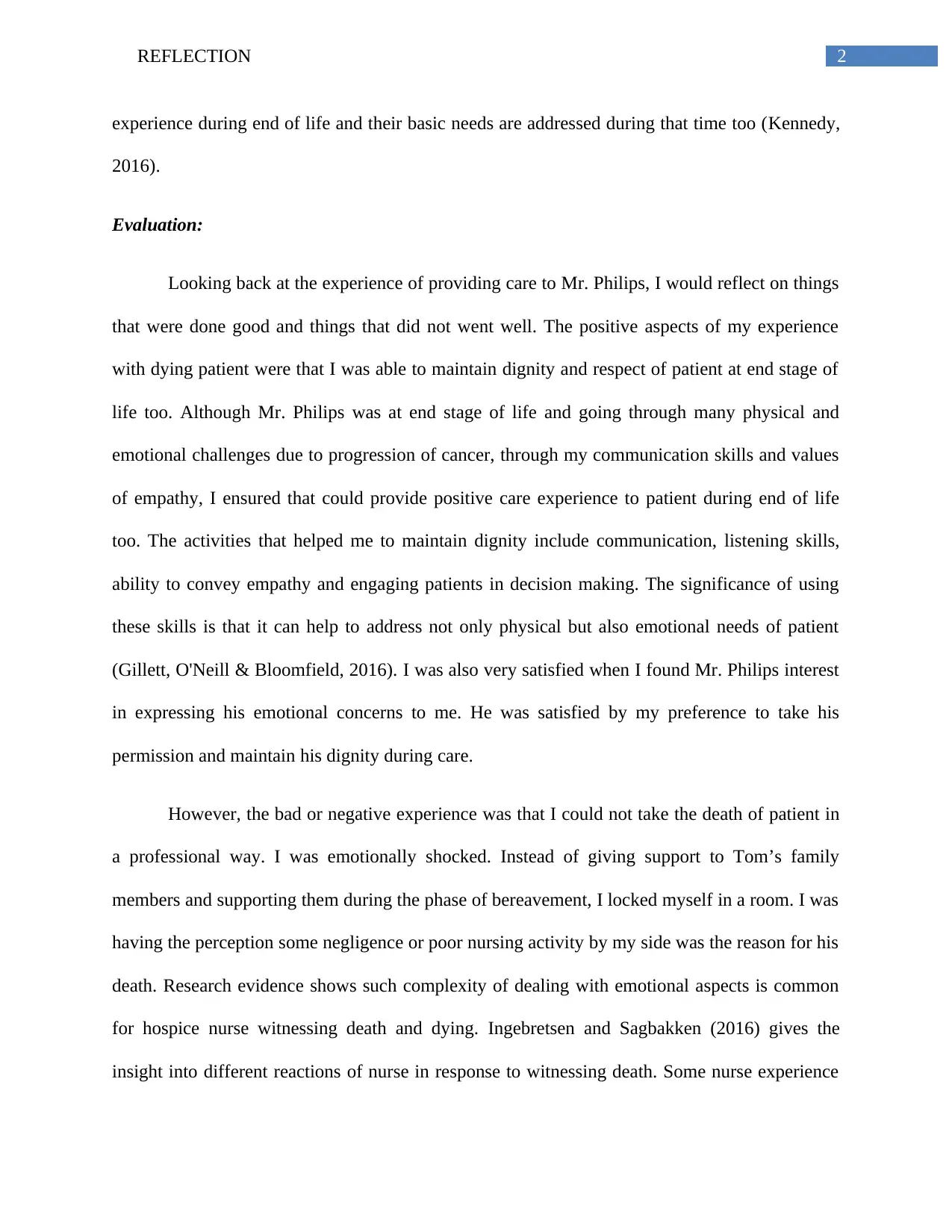
2REFLECTION
experience during end of life and their basic needs are addressed during that time too (Kennedy,
2016).
Evaluation:
Looking back at the experience of providing care to Mr. Philips, I would reflect on things
that were done good and things that did not went well. The positive aspects of my experience
with dying patient were that I was able to maintain dignity and respect of patient at end stage of
life too. Although Mr. Philips was at end stage of life and going through many physical and
emotional challenges due to progression of cancer, through my communication skills and values
of empathy, I ensured that could provide positive care experience to patient during end of life
too. The activities that helped me to maintain dignity include communication, listening skills,
ability to convey empathy and engaging patients in decision making. The significance of using
these skills is that it can help to address not only physical but also emotional needs of patient
(Gillett, O'Neill & Bloomfield, 2016). I was also very satisfied when I found Mr. Philips interest
in expressing his emotional concerns to me. He was satisfied by my preference to take his
permission and maintain his dignity during care.
However, the bad or negative experience was that I could not take the death of patient in
a professional way. I was emotionally shocked. Instead of giving support to Tom’s family
members and supporting them during the phase of bereavement, I locked myself in a room. I was
having the perception some negligence or poor nursing activity by my side was the reason for his
death. Research evidence shows such complexity of dealing with emotional aspects is common
for hospice nurse witnessing death and dying. Ingebretsen and Sagbakken (2016) gives the
insight into different reactions of nurse in response to witnessing death. Some nurse experience
experience during end of life and their basic needs are addressed during that time too (Kennedy,
2016).
Evaluation:
Looking back at the experience of providing care to Mr. Philips, I would reflect on things
that were done good and things that did not went well. The positive aspects of my experience
with dying patient were that I was able to maintain dignity and respect of patient at end stage of
life too. Although Mr. Philips was at end stage of life and going through many physical and
emotional challenges due to progression of cancer, through my communication skills and values
of empathy, I ensured that could provide positive care experience to patient during end of life
too. The activities that helped me to maintain dignity include communication, listening skills,
ability to convey empathy and engaging patients in decision making. The significance of using
these skills is that it can help to address not only physical but also emotional needs of patient
(Gillett, O'Neill & Bloomfield, 2016). I was also very satisfied when I found Mr. Philips interest
in expressing his emotional concerns to me. He was satisfied by my preference to take his
permission and maintain his dignity during care.
However, the bad or negative experience was that I could not take the death of patient in
a professional way. I was emotionally shocked. Instead of giving support to Tom’s family
members and supporting them during the phase of bereavement, I locked myself in a room. I was
having the perception some negligence or poor nursing activity by my side was the reason for his
death. Research evidence shows such complexity of dealing with emotional aspects is common
for hospice nurse witnessing death and dying. Ingebretsen and Sagbakken (2016) gives the
insight into different reactions of nurse in response to witnessing death. Some nurse experience
⊘ This is a preview!⊘
Do you want full access?
Subscribe today to unlock all pages.

Trusted by 1+ million students worldwide
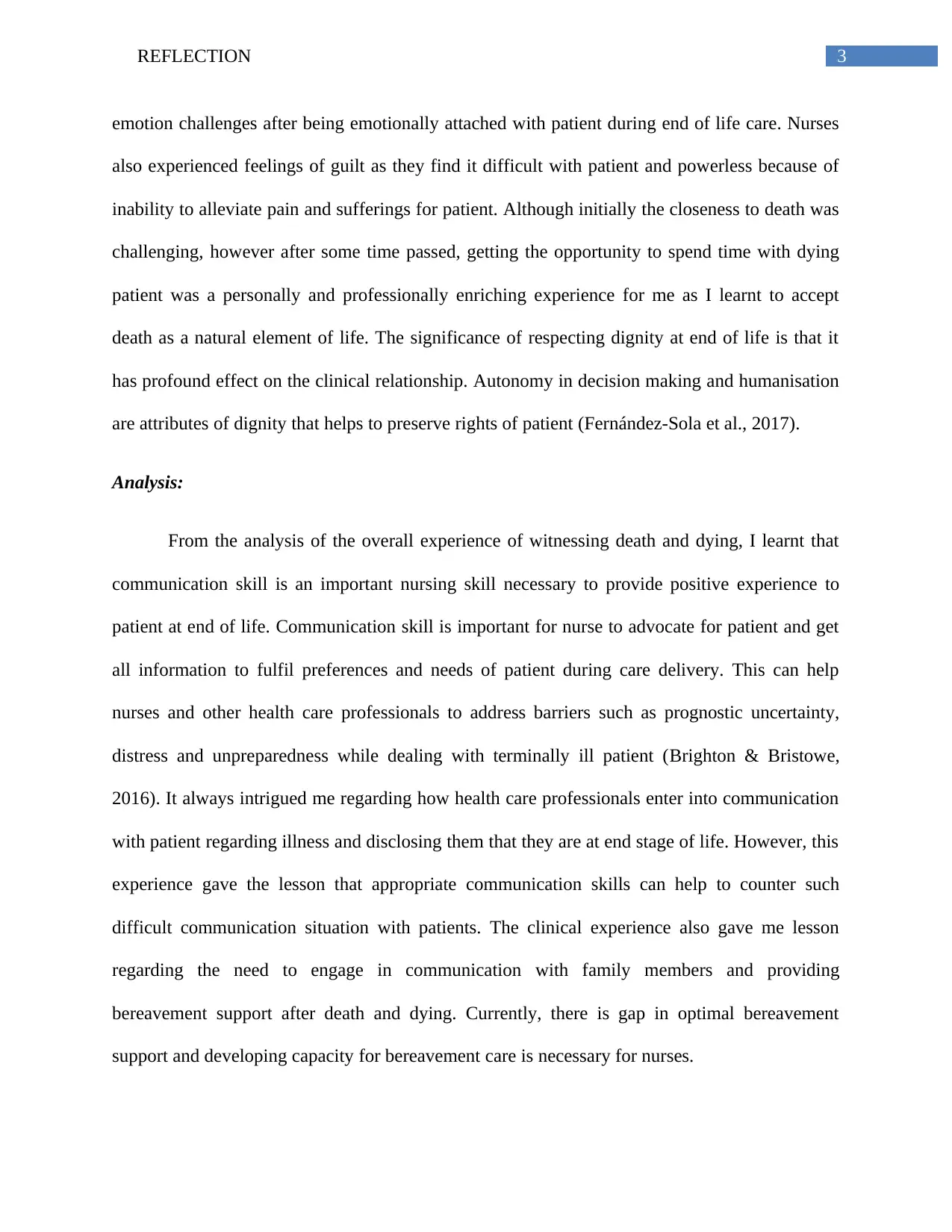
3REFLECTION
emotion challenges after being emotionally attached with patient during end of life care. Nurses
also experienced feelings of guilt as they find it difficult with patient and powerless because of
inability to alleviate pain and sufferings for patient. Although initially the closeness to death was
challenging, however after some time passed, getting the opportunity to spend time with dying
patient was a personally and professionally enriching experience for me as I learnt to accept
death as a natural element of life. The significance of respecting dignity at end of life is that it
has profound effect on the clinical relationship. Autonomy in decision making and humanisation
are attributes of dignity that helps to preserve rights of patient (Fernández-Sola et al., 2017).
Analysis:
From the analysis of the overall experience of witnessing death and dying, I learnt that
communication skill is an important nursing skill necessary to provide positive experience to
patient at end of life. Communication skill is important for nurse to advocate for patient and get
all information to fulfil preferences and needs of patient during care delivery. This can help
nurses and other health care professionals to address barriers such as prognostic uncertainty,
distress and unpreparedness while dealing with terminally ill patient (Brighton & Bristowe,
2016). It always intrigued me regarding how health care professionals enter into communication
with patient regarding illness and disclosing them that they are at end stage of life. However, this
experience gave the lesson that appropriate communication skills can help to counter such
difficult communication situation with patients. The clinical experience also gave me lesson
regarding the need to engage in communication with family members and providing
bereavement support after death and dying. Currently, there is gap in optimal bereavement
support and developing capacity for bereavement care is necessary for nurses.
emotion challenges after being emotionally attached with patient during end of life care. Nurses
also experienced feelings of guilt as they find it difficult with patient and powerless because of
inability to alleviate pain and sufferings for patient. Although initially the closeness to death was
challenging, however after some time passed, getting the opportunity to spend time with dying
patient was a personally and professionally enriching experience for me as I learnt to accept
death as a natural element of life. The significance of respecting dignity at end of life is that it
has profound effect on the clinical relationship. Autonomy in decision making and humanisation
are attributes of dignity that helps to preserve rights of patient (Fernández-Sola et al., 2017).
Analysis:
From the analysis of the overall experience of witnessing death and dying, I learnt that
communication skill is an important nursing skill necessary to provide positive experience to
patient at end of life. Communication skill is important for nurse to advocate for patient and get
all information to fulfil preferences and needs of patient during care delivery. This can help
nurses and other health care professionals to address barriers such as prognostic uncertainty,
distress and unpreparedness while dealing with terminally ill patient (Brighton & Bristowe,
2016). It always intrigued me regarding how health care professionals enter into communication
with patient regarding illness and disclosing them that they are at end stage of life. However, this
experience gave the lesson that appropriate communication skills can help to counter such
difficult communication situation with patients. The clinical experience also gave me lesson
regarding the need to engage in communication with family members and providing
bereavement support after death and dying. Currently, there is gap in optimal bereavement
support and developing capacity for bereavement care is necessary for nurses.
Paraphrase This Document
Need a fresh take? Get an instant paraphrase of this document with our AI Paraphraser
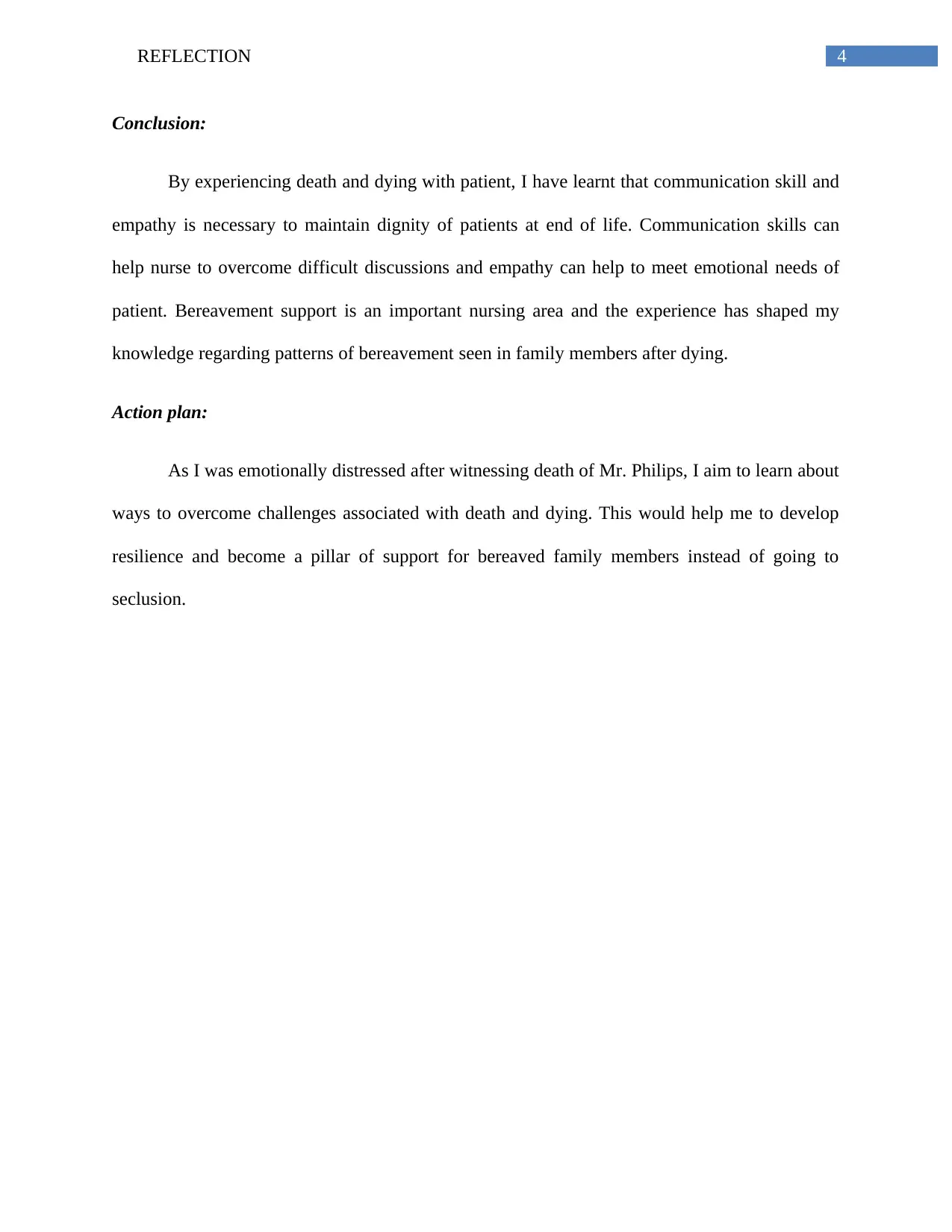
4REFLECTION
Conclusion:
By experiencing death and dying with patient, I have learnt that communication skill and
empathy is necessary to maintain dignity of patients at end of life. Communication skills can
help nurse to overcome difficult discussions and empathy can help to meet emotional needs of
patient. Bereavement support is an important nursing area and the experience has shaped my
knowledge regarding patterns of bereavement seen in family members after dying.
Action plan:
As I was emotionally distressed after witnessing death of Mr. Philips, I aim to learn about
ways to overcome challenges associated with death and dying. This would help me to develop
resilience and become a pillar of support for bereaved family members instead of going to
seclusion.
Conclusion:
By experiencing death and dying with patient, I have learnt that communication skill and
empathy is necessary to maintain dignity of patients at end of life. Communication skills can
help nurse to overcome difficult discussions and empathy can help to meet emotional needs of
patient. Bereavement support is an important nursing area and the experience has shaped my
knowledge regarding patterns of bereavement seen in family members after dying.
Action plan:
As I was emotionally distressed after witnessing death of Mr. Philips, I aim to learn about
ways to overcome challenges associated with death and dying. This would help me to develop
resilience and become a pillar of support for bereaved family members instead of going to
seclusion.
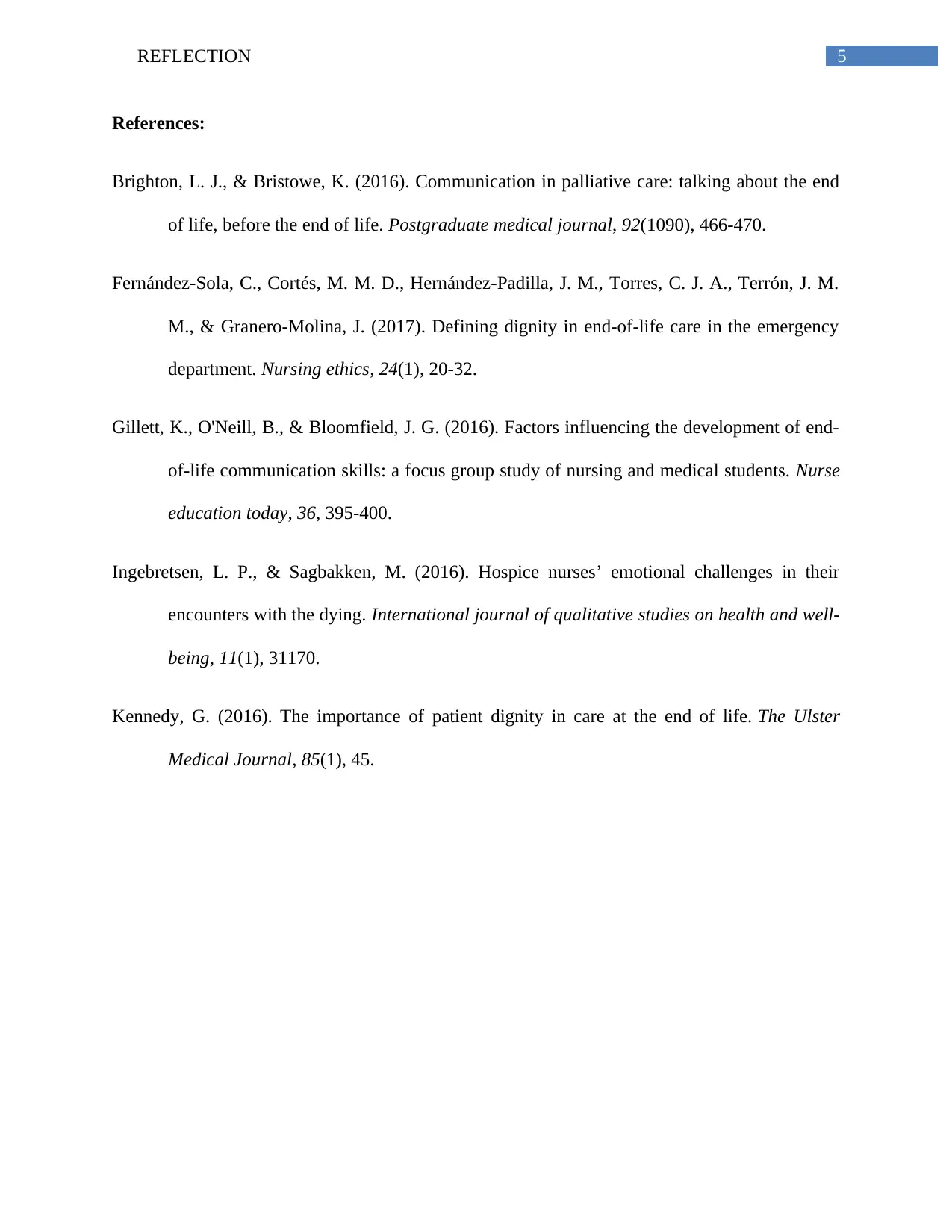
5REFLECTION
References:
Brighton, L. J., & Bristowe, K. (2016). Communication in palliative care: talking about the end
of life, before the end of life. Postgraduate medical journal, 92(1090), 466-470.
Fernández-Sola, C., Cortés, M. M. D., Hernández-Padilla, J. M., Torres, C. J. A., Terrón, J. M.
M., & Granero-Molina, J. (2017). Defining dignity in end-of-life care in the emergency
department. Nursing ethics, 24(1), 20-32.
Gillett, K., O'Neill, B., & Bloomfield, J. G. (2016). Factors influencing the development of end-
of-life communication skills: a focus group study of nursing and medical students. Nurse
education today, 36, 395-400.
Ingebretsen, L. P., & Sagbakken, M. (2016). Hospice nurses’ emotional challenges in their
encounters with the dying. International journal of qualitative studies on health and well-
being, 11(1), 31170.
Kennedy, G. (2016). The importance of patient dignity in care at the end of life. The Ulster
Medical Journal, 85(1), 45.
References:
Brighton, L. J., & Bristowe, K. (2016). Communication in palliative care: talking about the end
of life, before the end of life. Postgraduate medical journal, 92(1090), 466-470.
Fernández-Sola, C., Cortés, M. M. D., Hernández-Padilla, J. M., Torres, C. J. A., Terrón, J. M.
M., & Granero-Molina, J. (2017). Defining dignity in end-of-life care in the emergency
department. Nursing ethics, 24(1), 20-32.
Gillett, K., O'Neill, B., & Bloomfield, J. G. (2016). Factors influencing the development of end-
of-life communication skills: a focus group study of nursing and medical students. Nurse
education today, 36, 395-400.
Ingebretsen, L. P., & Sagbakken, M. (2016). Hospice nurses’ emotional challenges in their
encounters with the dying. International journal of qualitative studies on health and well-
being, 11(1), 31170.
Kennedy, G. (2016). The importance of patient dignity in care at the end of life. The Ulster
Medical Journal, 85(1), 45.
⊘ This is a preview!⊘
Do you want full access?
Subscribe today to unlock all pages.

Trusted by 1+ million students worldwide
1 out of 6
Related Documents
Your All-in-One AI-Powered Toolkit for Academic Success.
+13062052269
info@desklib.com
Available 24*7 on WhatsApp / Email
![[object Object]](/_next/static/media/star-bottom.7253800d.svg)
Unlock your academic potential
Copyright © 2020–2026 A2Z Services. All Rights Reserved. Developed and managed by ZUCOL.





